By Brother Holy Life
It was supposed to be the last Day of Mindfulness of our tour. A peaceful trip to west Bethlehem in a Salesian convent. Picking up the sisters from their abode in Bethlehem, I found it strange to hear their elderly host announce, “The war has started, be safe, maybe you want to leave now.”
Growing up in the Netherlands knowing only peace, never having heard a bomb explode or even a shot fired, this statement did not make sense to me. We went to the Day of Mindfulness as planned. At one moment along the way, we heard a big “boom” and one sister said: “Oh, they must be demolishing a building”. I looked at my brother and told the sisters what their host had said. Meanwhile, someone in the car in front of us leaned out of their car window and was pointing up to the sky. There we saw a white trail against the clear blue sky: a missile trail! Then it dawned on us, we are in a war. Yet, what do we do about the Day of Mindfulness? Maybe naively, we decided, “We will go and as long as there are people, there will be a Day of Mindfulness”.
But the venue closed. Our sangha friend advised us to leave the country as soon as we could, or at least try to get back into Israel. We tried, but the nearest checkpoint to Israel was closed. Could it be possible that we were stuck in occupied Palestinian territory as a war unfolded?
In this situation my body let me know that I was not safe. Ancestral seeds started to manifest among the group of us. For some it meant to not eat, to be focussed, to take it one step at a time. For others whose ancestors have more recently known hunger, they knew right away to get enough food, water and fuel for the car before it was too late! And sure enough, while driving to Bethlehem center to try the famous checkpoint 300, which 50% of the time is randomly closed, we saw cars starting to line up at a gas station.
Checkpoint 300 was also closed. We didn’t know if it would open again, or if any other checkpoints were open. We reached out to our sangha friends in Bethlehem, an amazing Palestinian family who had organized the Day of Mindfulness at the convent.
“Come to our home! We are picking up our daughters from school and will be back in ten minutes.”
We waited on their quiet street. Very soon, they arrived – a young father, mother, and two daughters, all beaming with bright smiles at us, and an excited shih tzu “Kira” wagging her tail. Even in this rush to bring their daughters home, they managed to bring home local pastries (vegan!) and welcomed us with coffee and tea.
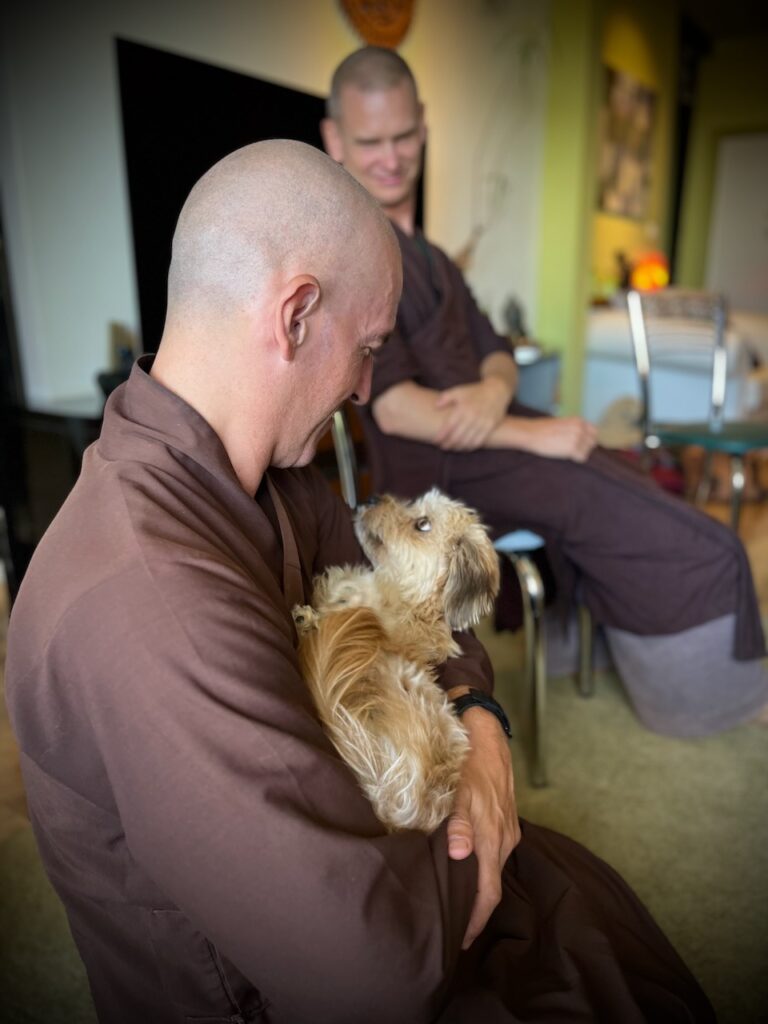
And I could not eat.
We could stay with them if needed, they announced. Their house was small, but they would make room for us. As we enjoyed their kind hospitality in the cosy living room, I noticed in myself that my diaphragm was in a knot. “Thank you dear body”, I said to myself, “thank you for letting me know that I might not be safe. I will make sure to really pay attention to each moment, so we can respond to what is needed.”
I stood quietly and started to walk slowly and mindfully in the room, paying close attention to my weight shifting to the left side, then swaying to the right side. It calmed me down.
The family had been to Plum Village. A sister in our group even knew their teenage daughter. “Finally, we could see you! And here is our mini Day of Mindfulness,” the sister said, helping everyone to shift attention to the preciousness of this moment.
The teenager was preparing for her final high school exams. Exams that she had been preparing years for and seemingly shaped her future. But how does a young person study for exams in two days when she, or for that matter, when no one knows what will happen in the next hour?
Knowing that the family loved music and the father had composed a song and recorded it together with his teenage daughter, the sister asked, “Could you sing for us your song about your love for Mother Earth?” They were delighted to show us the song.
The “booms” – the sound of missile interceptors – continued. Their younger daughter rushed into her room in a panic. I gently asked the mother if her daughter would like some help with this fear. Immediately, when the mother asked her, she said “yes”.
Around the same time, the young girl’s school called:
Could another girl in her class, who lives in East Jerusalem, come and stay for a while as it was unclear when the checkpoints would re-open?
Of course she was welcome!
Mother and both daughters dashed out to the car and very quickly brought back their young friend. Luckily it seems there was a protocol in such situations for children from the “other side of the wall” and later that morning, a designated vehicle came to pick up the young friend to bring her to East Jerusalem.
Back in the apartment, I looked for a “friendly” space to help the children learn how to calm themselves. The balcony right by the living room with its profusion of plants seemed ideal. The three of us stood there and I dug into my experience from the Plum Village “children program”. We learned to notice that there was not only the sensation of fear in us. In fact, at that moment, there were also spaces in the body that felt safe enough: the hands felt quite fine and noticing something small like that brought a smile. The fear which felt so big, suddenly felt much smaller as there was more space.
Inside the living room, father had brought out his guitar and everyone began to sing Plum Village songs.
“Dear friend, dear friend, let me tell you how I feel.
You have given me such treasures, I love you so.”
Earlier, mother had shared that whenever the family sang this song together, her younger daughter would not sing with them because it reminded her of Plum Village. She had felt safe there and did not want to leave.
That day, the younger girl walked over to the couch, plopped herself next to her sister and with a shy smile, sang with us. With music and smiles, we embraced this little person. We all relaxed more and touched the healing power of Sangha, joy, and togetherness.
We sang one song after another. The teenager received a message from a friend – one of the checkpoints might be open.
What do we do?
We felt safe and anchored where we were. The thought of driving through narrow streets with scant information and facing uncertain checkpoints was daunting, especially for one sibling who’s grandparents survived the war by staying put in their village home.
Acknowledging these ancestral seeds, we succinctly expressed our feelings and listened.
“It’s really important that no one feels obliged in this situation.”
“I would prefer to cross the checkpoint and get closer to the airport.”
“Let’s go.”
“Ok. I follow the group.”
After many hours of waiting, we were able to cross a checkpoint and reach our sangha friends in Neve Shalom | Wahat as Salam, the “Oasis of Peace”. It is an intentional community where since 1970, Jews, Christians and Muslims have lived peacefully together and started the first Arabic/Hebrew bilingual school.
The gate was always open to their community, but it soon locked during the day. People were afraid. Yet after a few days the community was able to come together and speak and listen to each other about the pain. First separately for the Jewish people and the Palestinian citizens of Israel, and then together. Our sangha friend there shared with us that the collective listening was deep, raw, and very healing.
Our five days in this “Oasis of Peace” were filled with uncertainty and beauty. We searched day and night for flights, and flight after flight was cancelled. The elder sister of our group, seeing us young ones glued to computers in search of information, gently urged us – “Let’s walk. The nearby pine forest is very beautiful.”
She was right. How wonderful to have elders on the path, and a practice that anchors us in the present and not forget the wonders that are still here.
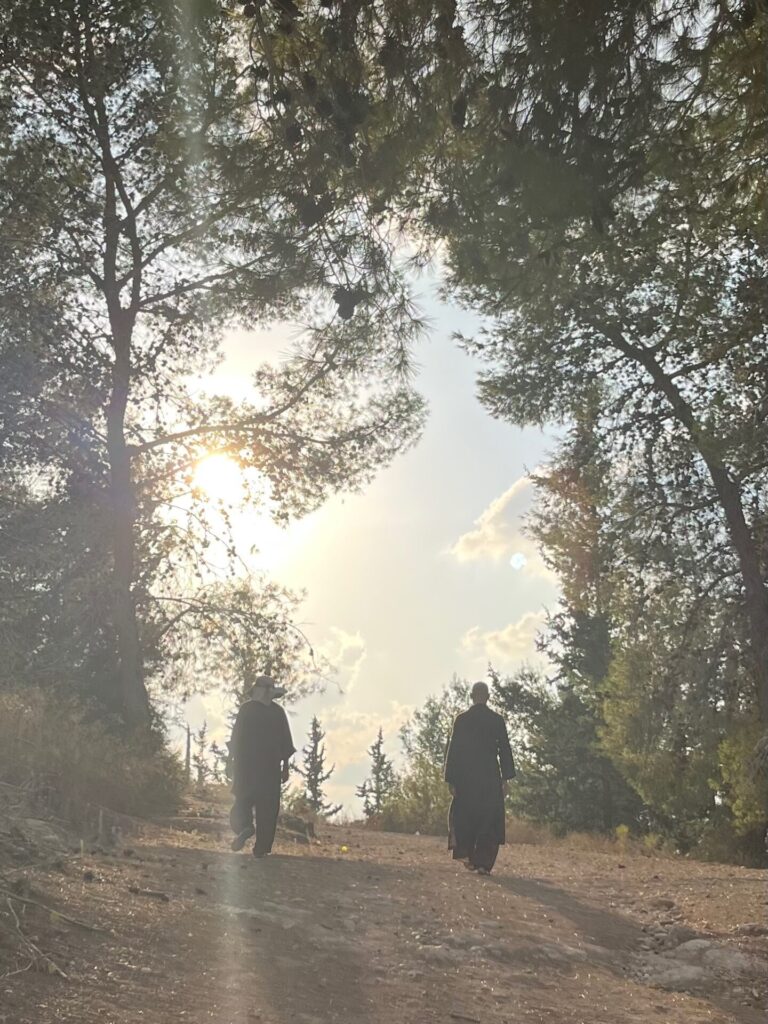
We walked, imprinting our determination to cultivate peace and compassion on the sandy soil.
We walked past carob trees, laden with sweet, “chocolaty” pods.
We walked as our hosts’ little grandchildren picked up discarded plastic along the way, and a siren sounded and one child started to cry.
We walked through the bilingual school where young mothers with and without headscarves watched on as their toddlers stretched out for a yoga class.
We walked as a military helicopter swooped low beside us and a crimson sun set on these ancient hills.
[Photo: Neve Shalom – 2023 October 11]
Each day, we gathered for mindful and delicious meals together. We started the meals with a silent contemplation in gratitude for the miracle of having water, food, shelter, and good friends! Our sangha friends took care of us like their own children, offering us whatever food and space they had in their home while they themselves did not know how the war would unravel.
When many of us are doing that, a little bit everywhere, aren’t we all the beloved children of someone, somewhere?
The morning we left for the airport, the kitchen was fragrant with freshly toasted muesli and a pot of gently simmering chickpea. Standing outside their home, a true oasis of peace, we held back tears.
“Shall we sing ‘in gratitude’?”
“Oh yes.”
“In gratitude you have watered seeds of love in me, in gratitude.
In gratitude I will water seeds of love in someone, too.
I know you’re there for me, and I am so happy.
…
And when you suffer some, please call and I will come.”
It was on the plane back home that the younger girl’s experience hit me: “I do not want to sing Plum Village songs, as I felt safe there”. As tears flowed down my cheeks, I realized I have a passport which allows me to leave, to feel safe, but so many do not have that opportunity.
Now back in Plum Village I still feel the suffering of all those friends we have left behind. Now, I also feel that a part of me is still in them and they are in me – no longer do I wish to practice in order for that suffering I now feel to go away.
The part about interbeing that nobody talks about is that the more we realise we inter-are, the more we feel the suffering of each other. Suffering, just like joy, is non-local. As the self expands to include ever more of reality, we also come closer to the truth of who we really are.
We feel deeply grateful for the beautiful generosity of our Palestinian friends in Bethlehem and our sangha hosts in the “Oasis of Peace”. We have stayed in contact with both families and know that for the time being, they are well. I pray for all of us that we continue to see humanity in the “other”.
At this time we really need to practice to recognize the pain around the war in Israel Palestine, so that we can honour the pain and take care of it. To know – which thoughts do we keep thinking? What suffering do we keep watering? How do we tend to our suffering so our understanding can continue to grow?
The practices of Plum Village were developed in a time of war, to respond to the immense challenges of living in a war. But it is so easy to forget to actually practice them.
We need to practice! Practice walking in mindfulness, practice following our breathing, practice relaxing our bodies, practice touching the wonders of life, so we can see clearly again. We need to be able to let go of the stories, of trying to find solutions out there, of our habit of seeing ourselves or our people as victims, so long as they are still informed by our pain.
Thay reminded us that we need to see the suffering of the other too and that the real solution lies in seeing the other as ourselves, then killing becomes impossible.
I see for myself that this experience has taught me the courage to name the roots of suffering. The Buddhist approach is always to look at the roots of suffering and it is okay to do so and to help people with this. We can jump too quickly to solutions and get lost in words that have all sorts of emotional impact. But if we have not yet accepted the suffering, if we have not yet felt the pain, it would heavily color our perceptions, thinking, speaking, and actions.
We practice so that we are not consumed by anger, hatred, intolerance, fear, despair…and sacrifice our deepest love and aspiration for the well being of all people. We practice to see that the roots of war can also be found in ourselves and that there is something that we can do right now in order to bring more peace, more compassion into the world.
Chant of stillness from the “Breathing Dome” of Neve Shalom | Wahat al Salam
Articles




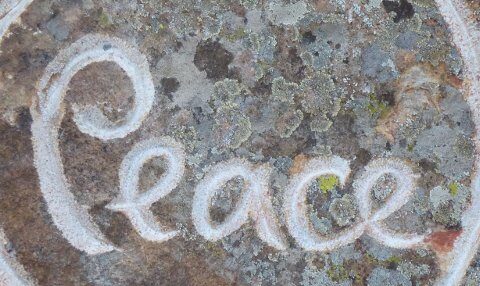
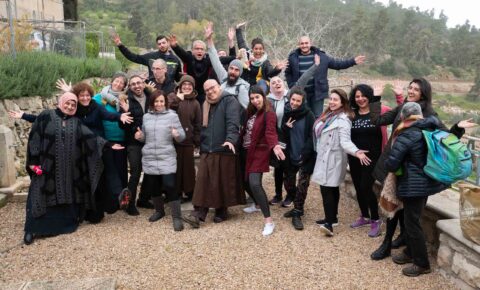
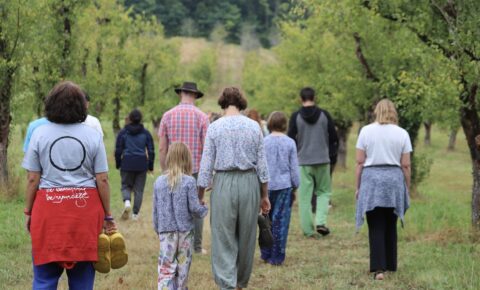
Share Your Reflections